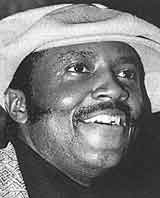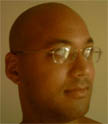Donny Hathaway

Donny Hathaway was one of the brightest new voices in soul music at the dawn of the '70s, possessed of a smooth, gospel-inflected romantic croon that was also at home on fiery protest material.
Hathaway achieved his greatest commercial success as Roberta Flack's duet partner of choice, but sadly he's equally remembered for the tragic circumstances of his death -- an apparent suicide at age 33. Hathaway was born October 1, 1945, in Chicago, but moved to St. Louis when he was very young, and began singing in church with his grandmother at the scant age of three. Donny's grandmother, Martha Cromwell, was a respected Gospel singer in her own right. Donny grew up, as did many of his contemporaries, with Gospel roots. He began playing piano at a young age, and by high school, he was impressive enough to win a full-ride fine arts scholarship to Howard University to study music in 1964.
He studied music at Howard University in Washington during 1964, where his room mate was Leroy Hutson. The pair were later to pen the song 'The Ghetto', together. Donny majored in musical theory before performing in a cocktail jazz group called the Ric Powell Trio, and wound up leaving school after three years to pursue job opportunities he was already being offered in the record industry.

Hathaway first worked behind the scenes as a producer, arranger, songwriter, and session pianist/keyboardist. He supported the likes of Aretha Franklin, Jerry Butler, and the Staple Singers, among many others, and joined the Mayfield Singers, a studio backing group that supported Curtis Mayfield's Impressions. Hathaway soon became a house producer at Mayfield's Curtom label, and in 1969 cut his first single, a duet with June Conquest called "I Thank You Baby." From there he signed with Atco as a solo artist, and released his debut single, the inner-city lament "The Ghetto, Pt. 1," toward the end of the year. While it failed to reach the Top 20 on the R&B charts, "The Ghetto" still ranks as a classic soul message track, and has been sampled by numerous hip-hop artists. "The Ghetto" set the stage for Hathaway's acclaimed debut LP, Everything Is Everything, which was released in early 1970. In 1971, he released his eponymous second album and recorded a duet with former Howard classmate Roberta Flack, covering James Taylor's "You've Got a Friend." It was a significant hit, reaching the Top Ten on the R&B charts, and sparked a full album of duets, Roberta Flack & Donny Hathaway, which was released in 1972. The soft, romantic ballad "Where Is the Love?" topped the R&B charts, went Top Five on the pop side, and won a Grammy, and the accompanying album went gold.
Also in 1972, Hathaway branched out into soundtrack work, recording the theme song for the TV series Maude and scoring the film Come Back Charleston Blue. However, in the midst of his blossoming success, he was also battling severe bouts of depression, which occasionally required him to be hospitalized. His mood swings also affected his partnership with Flack, which began to crumble in 1973. Hathaway released one more album that year, the ambitious Extension of a Man, and then retreated from the spotlight; over the next few years, he performed only in small clubs. In 1977, Hathaway patched things up with Flack and temporarily left the hospital to record another duet, "The Closer I Get to You," for her Blue Lights in the Basement album. The song was a smash, becoming the pair's second R&B number one in 1978, and also climbing to number two on the pop charts. Sessions for a second album of duets were underway when, on January 13, 1979, Hathaway was found dead on the sidewalk below the 15th-floor window of his room in New York's Essex House. The glass had been neatly removed from the window, and there were no signs of struggle, leading investigators to rule Hathaway's death a suicide; his friends were mystified, considering that his career had just started to pick up again, and Flack was devastated. Roberta Flack Featuring Donny Hathaway was released in 1980, and both of the completed duets -- "Back Together Again" and "You Are My Heaven" -- became posthumous hits. In 1990, Hathaway's daughter Lalah launched a solo career. ~ Steve Huey, All Music Guide
According to Steven Leventhal:
"... it is claimed that he threw hiumself out of a 15th floor New York City hotel window for unexplained reasons. The reason was not "unexplained". He was with Roberta Flack in that hotel room (actually, I was told by Roberta Flack's son that it was the Plaza Hotel, rather than the Essex House), with whom he has co-performed various hit songs with over the years, and (having heard this from Roberta Flack's son, whom I met at Temple University in Philadelphia . . . perhaps in 1986 or 1987, if I recall accurately), Donny Hathaway was in love with Roberta Flack and wished she could be his but she was already married to someone else. Distraught over not being able to have her as his own, he threw himself out the window (with Roberta Flack in the room at the time). And this story was reported as well in the media at the time of his death. When I'd met Roberta Flack's son and learned that he was her son, I asked him if it was true about what I had read (which is that Donny Hathaway had killed himself over his mother). He said this is true and told me the story, saying his mother was right there when it happened."



0 Comments:
Post a Comment
<< Home